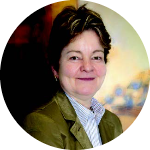Yankee Candle Maker Boosts Employee Morale | October 2021
Ravi Saligram took over Newell Brands, the owner of Yankee Candle, and made some big changes. Focusing on meeting employee needs and boosting satisfaction, morale and profits increased.

Newell Brands, the company behind Yankee Candle, Sharpie, Rubbermaid, and more, had a toxic work environment. That was until Ravi Saligram took charge as the CEO, president, and a member of the board of directors.
Saligram formerly served as the CEO of OfficeMax and Ritchie Bros. Auctioneers Inc. He was born in New Delhi, the capital of India, and attended the University of Michigan to earn his M.B.A.
When Saligram joined Newell in 2019, he made a splash in a presentation shown to the company’s 30,000 employees worldwide that said, “no assholes.” This short and simple message is one of Saligram’s key tenets and a core element of his management philosophy.
Newell Struggles
At the time, the company was in the midst of a restructuring—not the first the organization had faced—and had faced years of declining sales. The company had acquired many brands that were ultimately not a good fit for the company. Newell focused on Yankee Candle. As Newell struggled, dozens of managers were fired or left the company, and about one-third of director-level employees quit.
Repairing Morale
According to Saligram, the company suffered greatly due to infighting among executives and the fear of retribution. Employees were afraid they would be consequences and punishments if they made mistakes or voiced their opinions. Many employees ultimately quit because they did not agree with the direction Newell was going in.
Saligram believes that growing shareholder value is contingent upon driving stakeholder values. He knew he needed to focus on improving employee relations for the company to put its best foot forward. He spent his first three months at the company making observations, touring the company’s global operations, and having conversations with employees and managers. He collected and read anonymous employer ratings from websites such as Glassdoor. He noticed employees kept their heads down and with a survival mindset.
Saligram strived to give employees freedom and security to empower them and improve the corporate atmosphere. He has an open-door policy, making himself available for candid conversations. This is all in an effort to build trust and repair morale.
This was put to the test when Saligram proposed changes to Newell’s structure. After receiving feedback from senior leaders who feared Saligram’s plan would result in a company that was too centralized, Saligram compromised, implementing a hybrid system that spread authority to business-unit leaders.
Brighter Days Ahead
Under Saligram’s leadership, the company has reduced its debts and increased its sales. Additionally, Newell’s share price has increased by 33 percent.
In addition to higher morale across the company, the company now enjoys greater diversity in its upper ranks. Half of the company’s business units are led by women, and the company has initiatives in place to retain and promote people of color.
Saligram conducted a company-wide survey to see how employees viewed inclusivity and pay parity and provide a forum for feedback. He acknowledges that the company still has a long way to go in the areas of diversity, equity, and inclusion. So far, Newell has created employee resource groups for women, Asian Americans, African Americans, veterans, and LGBTQ+ employees. He aims to create a sense of belonging where everyone can be their authentic selves.
Saligram has been recognized by the Atlanta Business Chronicle as one of the city’s most admired CEOs.
In the Classroom
This article can be used to discuss leadership (Chapter 6: The Nature of Management), morale and motivation (Chapter 9: Motivating the Workforce), and inclusion (Chapter 10: Managing Human Resources).
Discussion Questions
- What steps to Saligram take to learn about Newell’s atmosphere?
- What problems did Newell face prior to Saligram’s arrival?
- Why do you think it takes a long time to implement cultural change at an organization such as Newell?
This article was developed with the support of Kelsey Reddick for and under the direction of O.C. Ferrell and Linda Ferrell.
Sources:
Daniel Kuhn and Katherine Ross, “A Marathon, Not a Sprint: Newell CEO on Building Inclusion in the Workplace,” TheStreet, October 5, 2021, https://www.thestreet.com/video/newell-ceo-worplace-inclusion-coffee-katherine-video-interview
Sharon Terlep, "A No-Jerks Policy Ignited Morale at the Company Behind Yankee Candle," The Wall Street Journal, July 30, 2021, https://www.wsj.com/articles/a-no-jerks-policy-ignited-morale-at-the-company-behind-yankee-candle-11627658610
"Q&A with Ravi Saligram, one of Atlanta's 2021 Most Admired CEOs," Atlanta Business Chronicle, August 10, 2021, https://www.bizjournals.com/atlanta/news/2021/08/10/ravi-saligram-newell-brands-most-admired-ceos.html?b=1628605132%5E21951123



